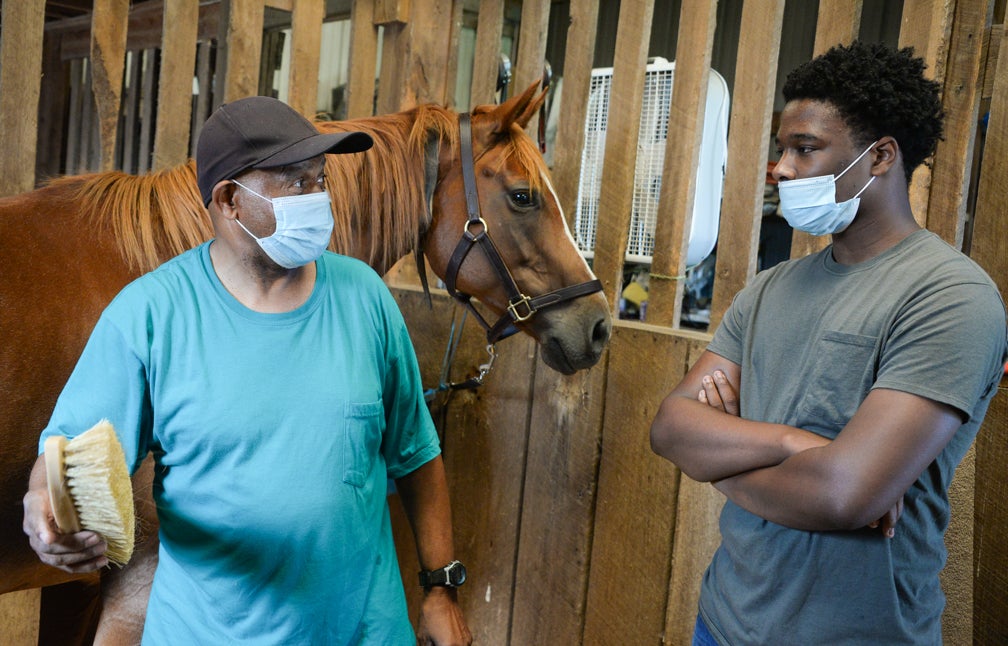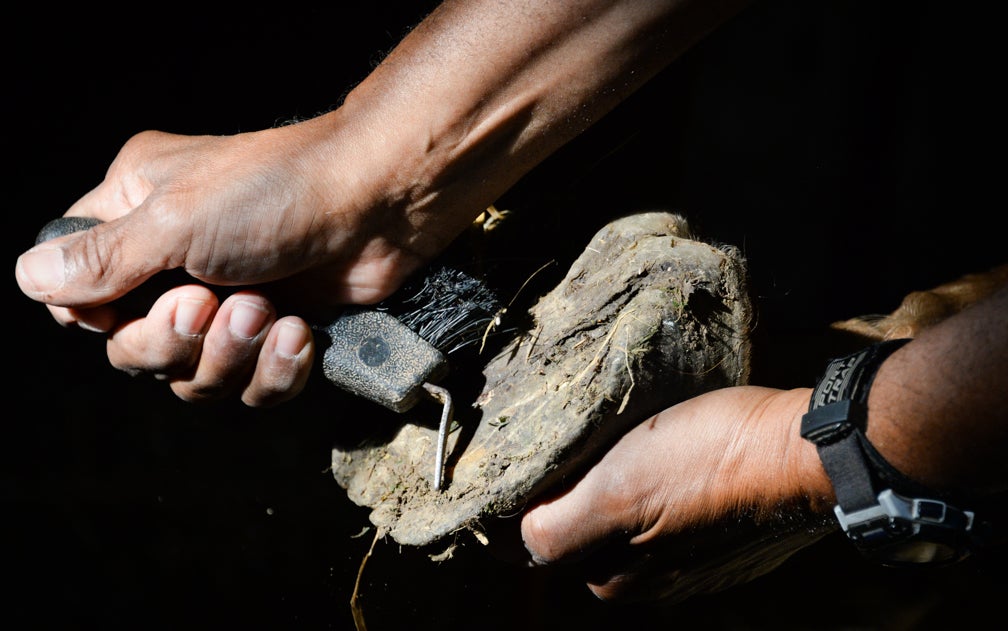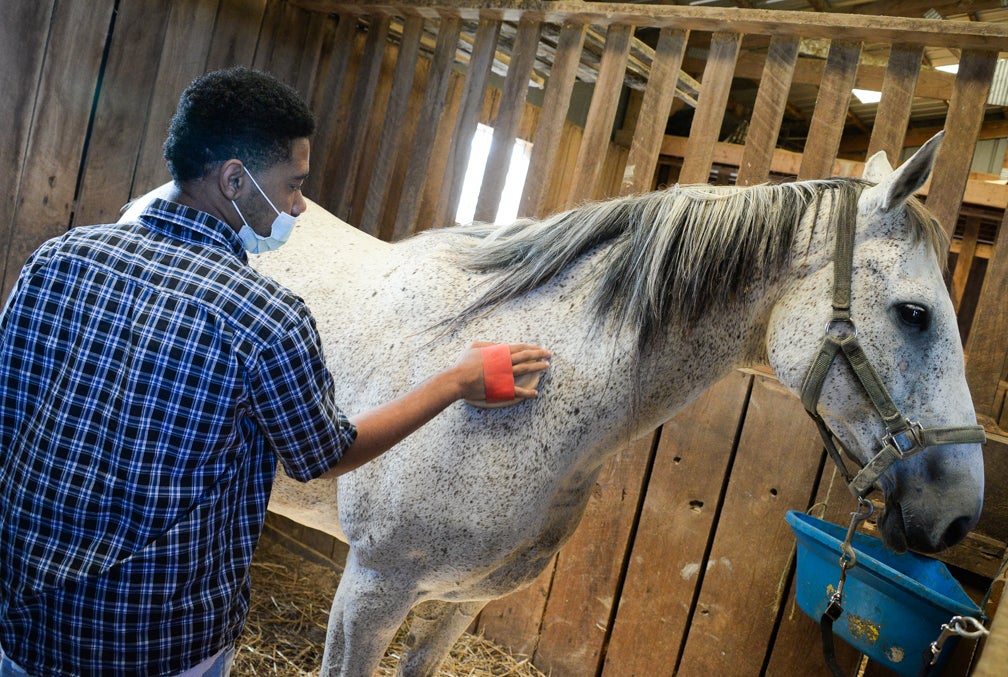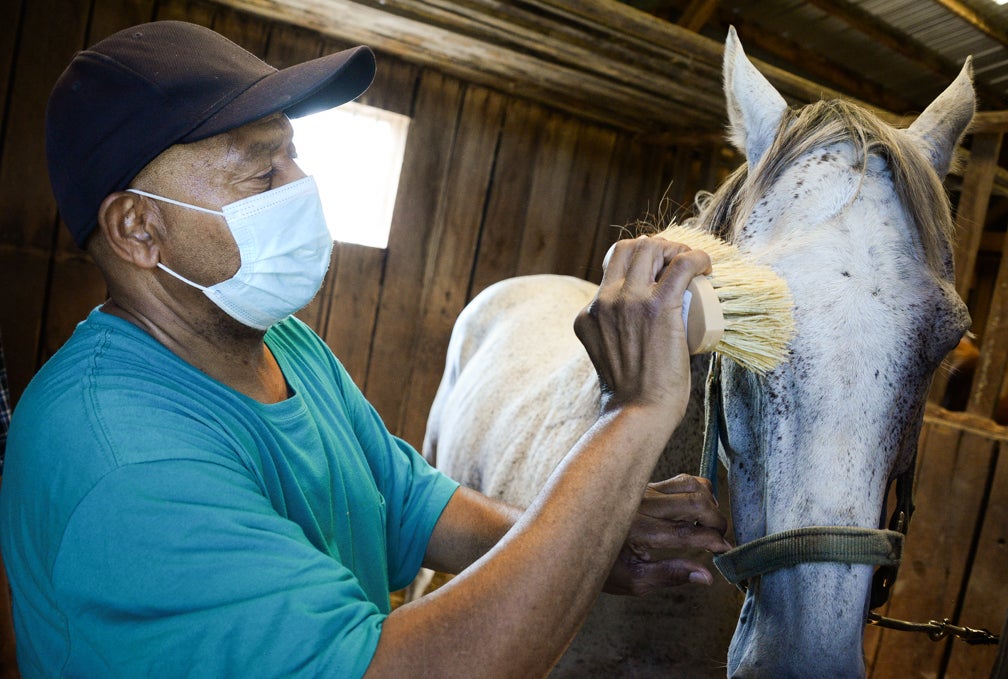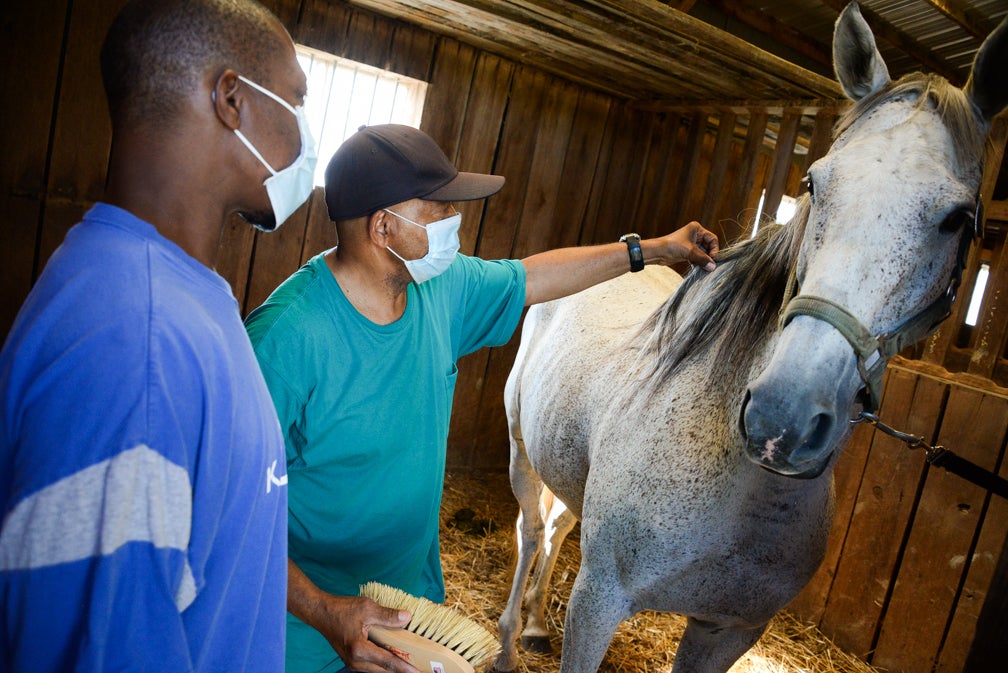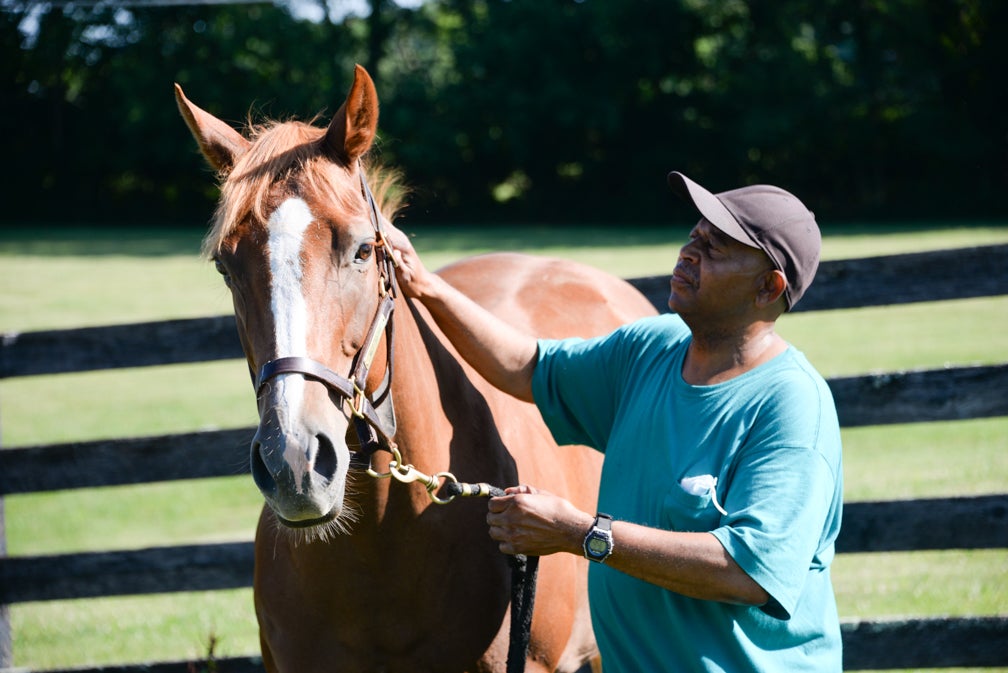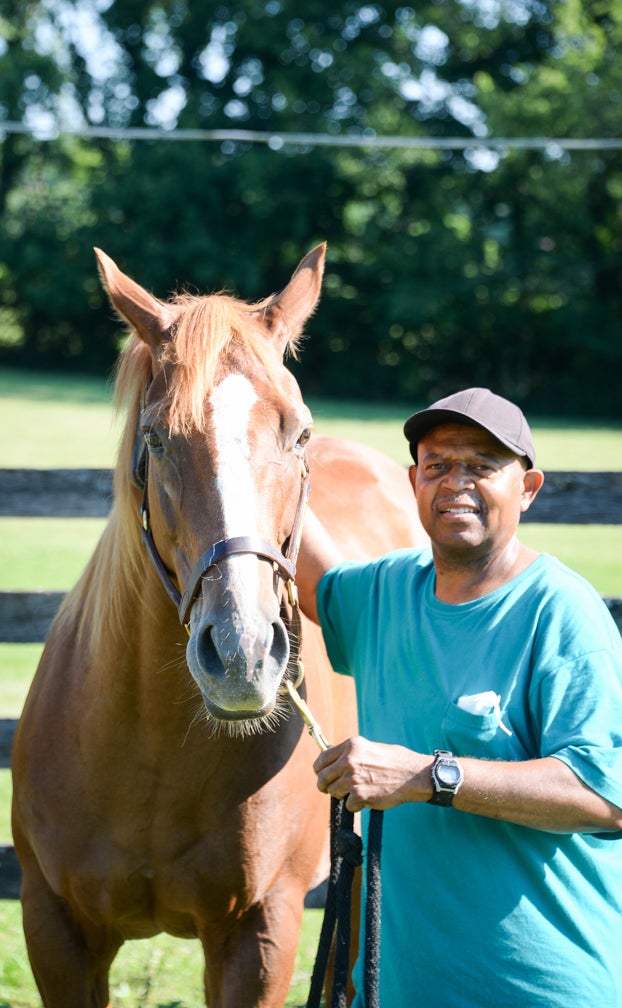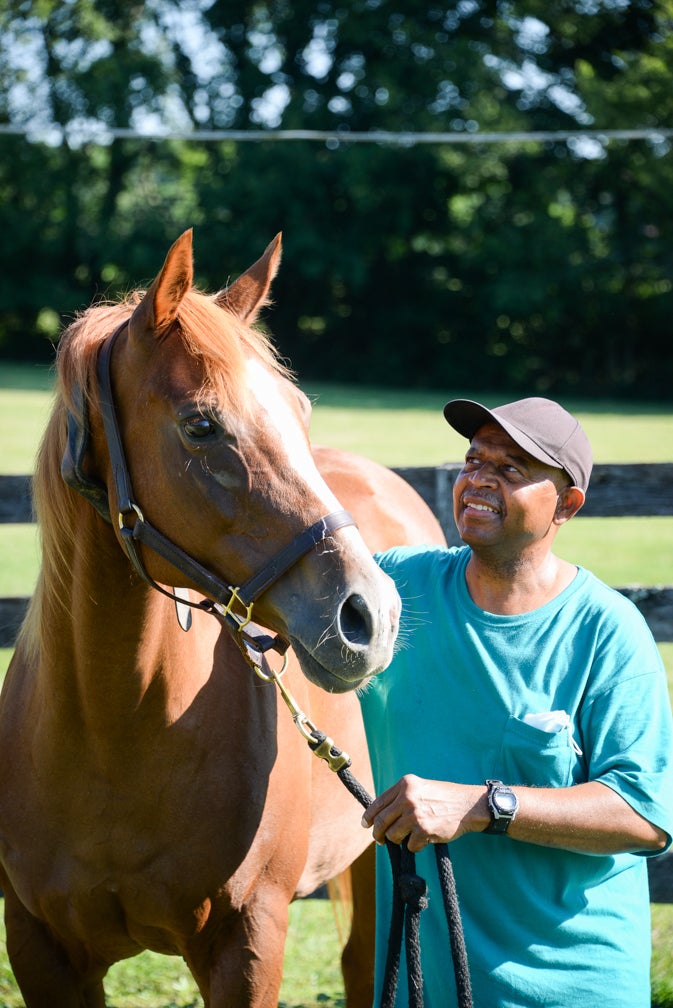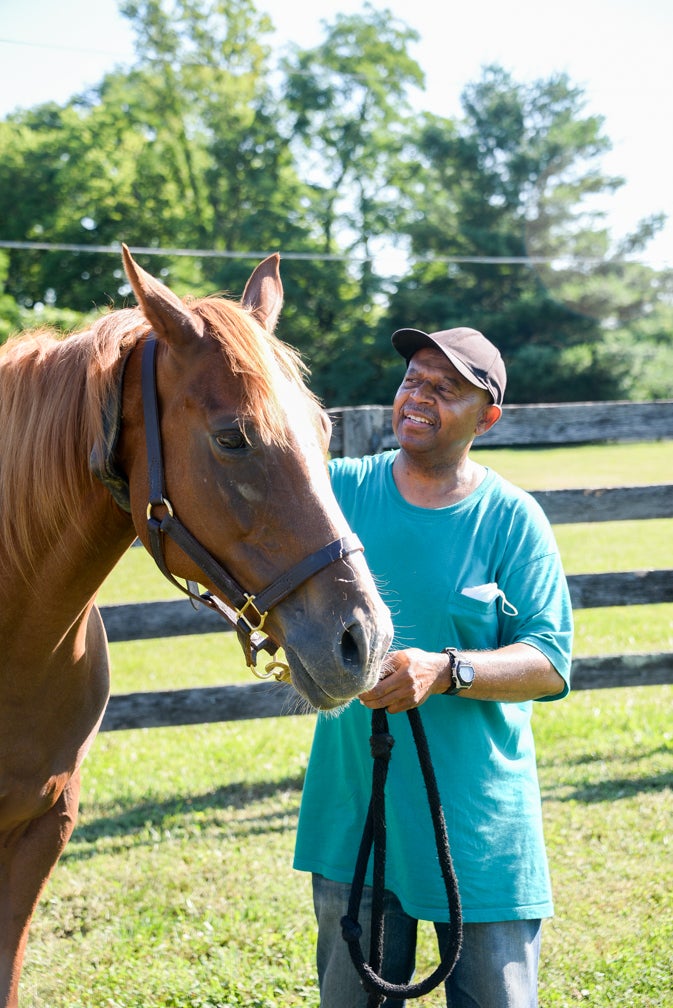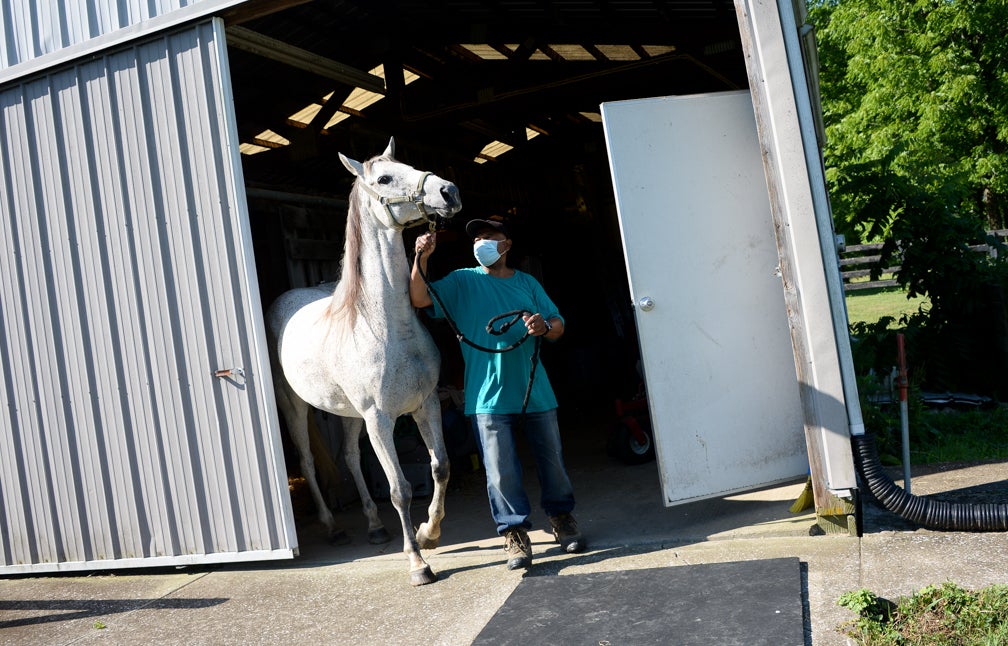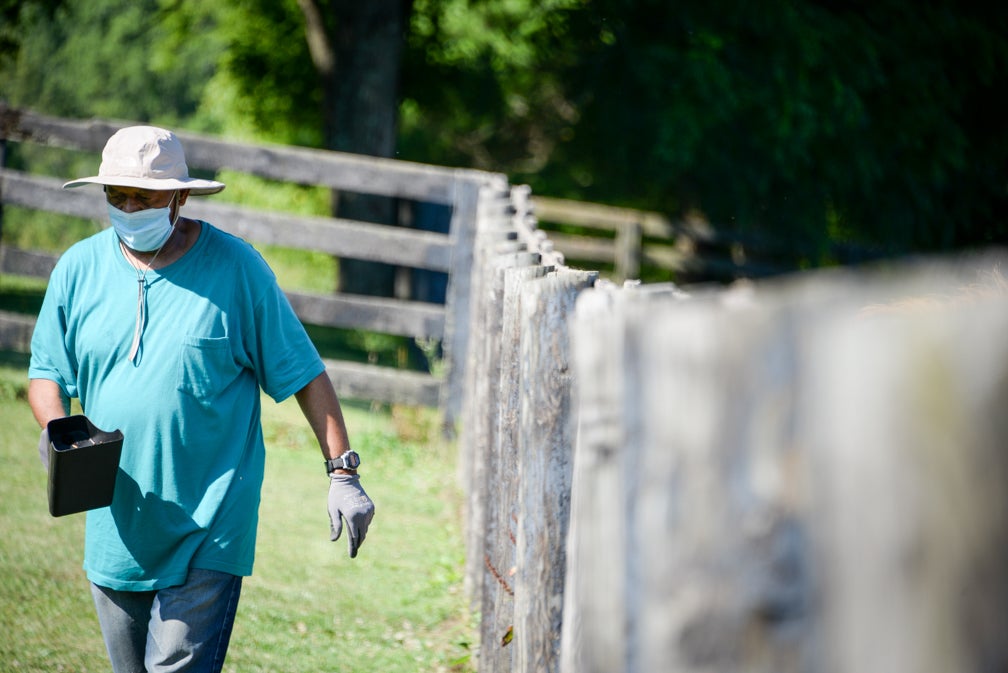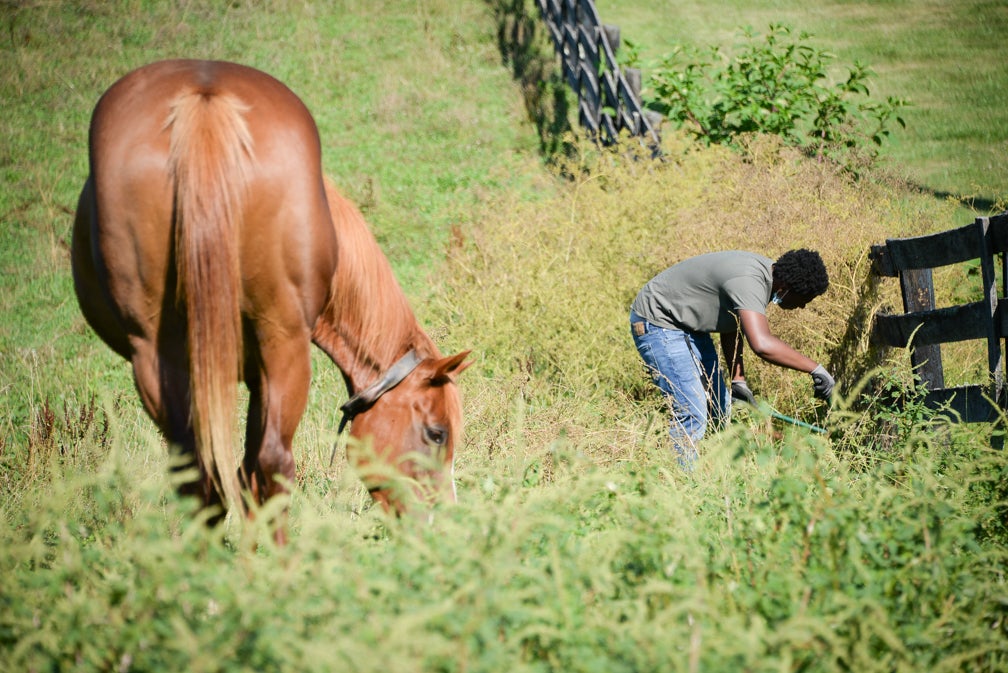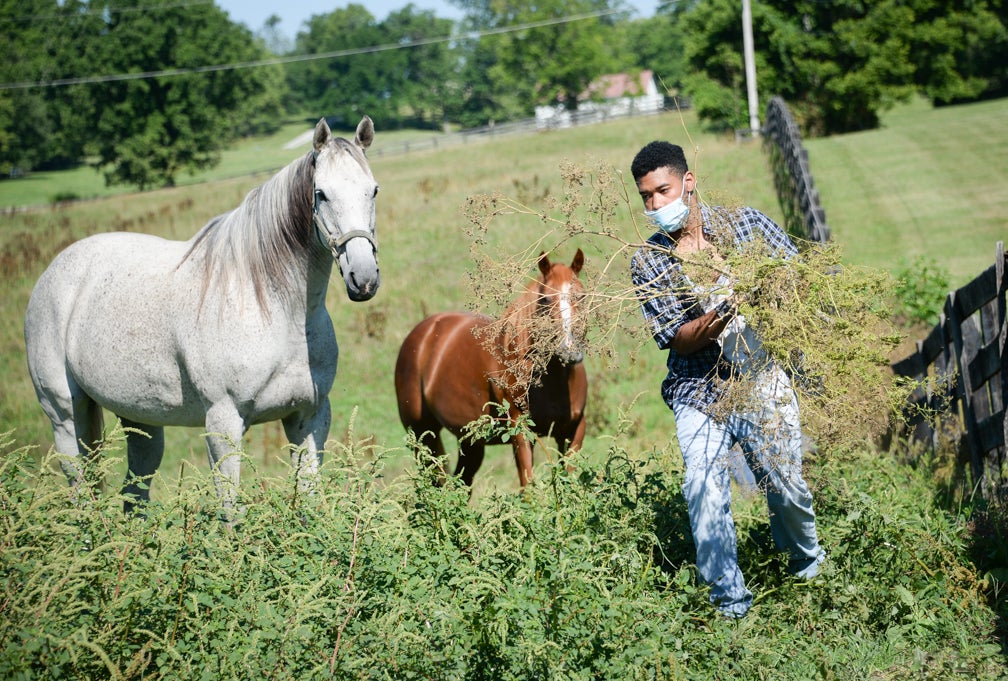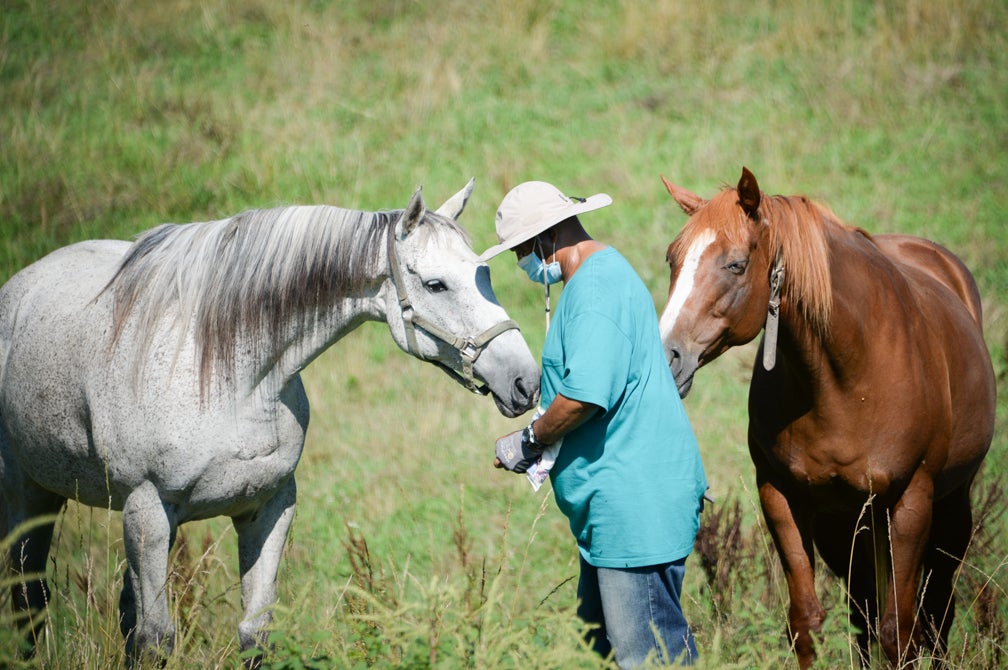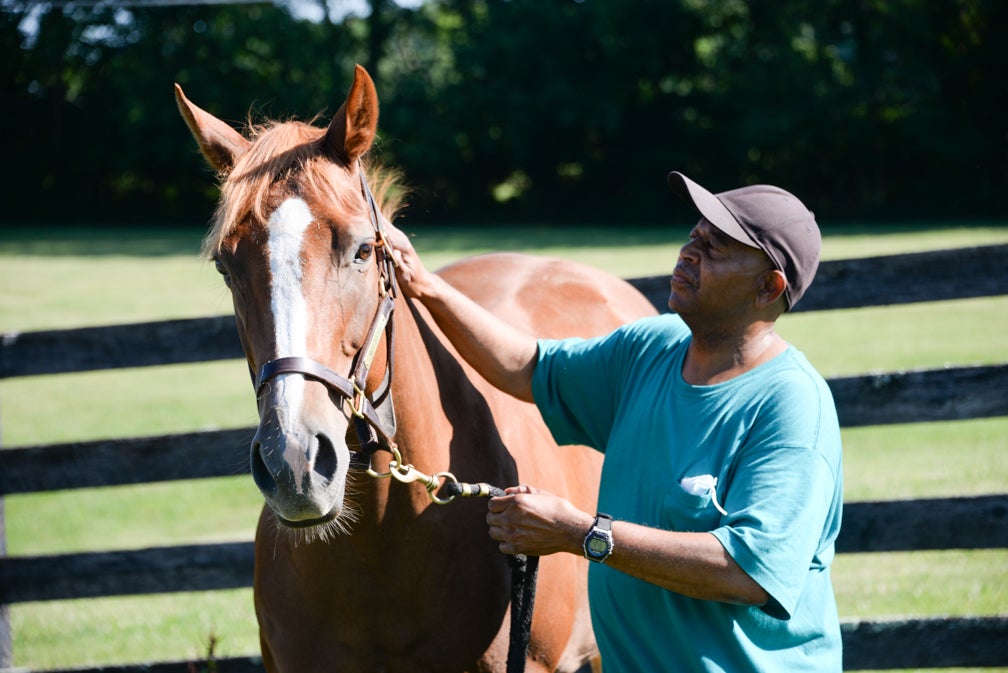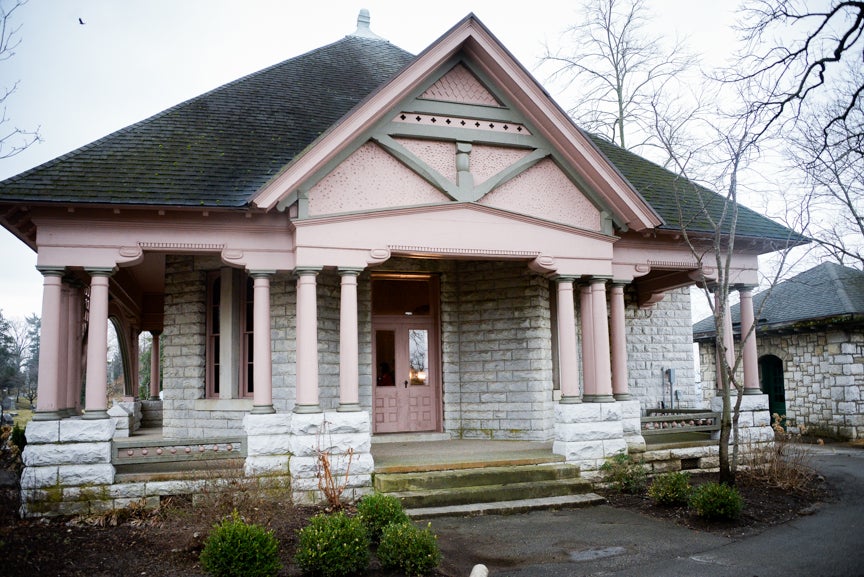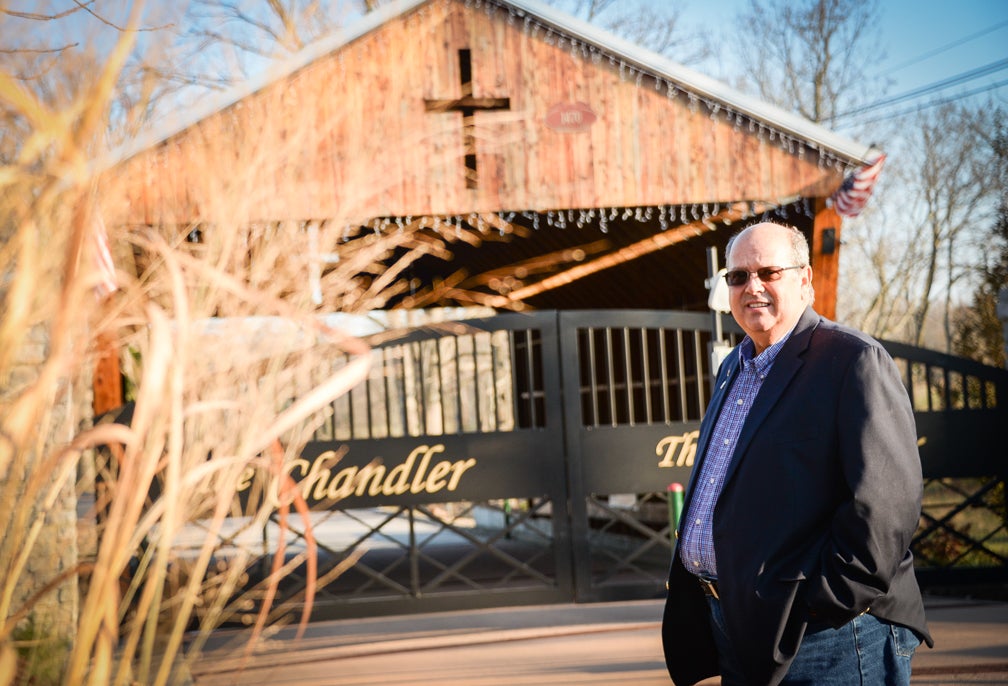Just as the Lord gave David sheep, Pastor Les Whitlock said he has received horses.
“Horses are the gift God gave me,” Whitlock said about the animal that has always been a constant in his life.
Horses have taught Whitlock many life lessons that he shares with youth and troubled adults in the community through the program New Day Ministries at his church, First Corinthian Missionary Baptist on Murray Street in South Frankfort.
One of Whitlock’s first life lessons learned was how to build a strong work ethic. When he was growing up in Bowling Green, he worked on a horse farm with his stepfather, Ollie White. His stepfather trained and broke saddlebred horses for Richard Duncan on Milky Way Farm.
“I grew up working on the farm,” Whitlock said. “I would clean the stalls at 6, 7 and 8 years old,” as his stepfather would train the horses to do a variety of gaits for shows. Whitlock said his stepfather trained several world champion horses, including the famous Wing Commander.
As hard as he worked to break and train the horses, being an African American, his stepfather couldn’t show the horses in the south. Whitlock said he had to go to northern cities, like Chicago and New York City, to compete in shows. He showed at Madison Square Garden.
Whitlock also learned to groom horses while working on the farm. The grooming process involves several different brushes, tools and techniques used to make a horse look its best.
“I groom so good, if a fly lands on a horse’s back, it slides off and breaks its leg,” he said. “You have to use the right brushes and combs — soft and hard brushes, and a certain towel. These are things they used in the Old Testament. It takes the dirt off, but keeps natural oils.”
As he got older, Whitlock began to start breaking horses. This is when he learned patience.
“I was small and light, so they put me on horses that they were breaking,” he said.
In 1969, a man from Lexington brought a thoroughbred to the farm to be broken. The horse was considered a “runoff,” Whitlock said. “They needed someone who could take their time with it and be slow and take care of his legs.”
Whitlock worked slowly with the horse, starting first with walking it on a lead. When he began to ride it, he kept the stirrups low and rode in a small area so the horse couldn’t take off running. He kept his hands loose on the reins and talked softly to keep the horse relaxed.
“Dealing with problem horses is what I’ve done my whole life,” he said. “Anyone can ride them when I get through with them.”
When the horse was ready, the owner put it back in training. That horse went on to win a race at Keeneland, Whitlock said.
When Whitlock was a sophomore in high school, Duncan only had two horses left and he moved them to 3T Farm, owned by Glendale Tabor. Whitlock continued to care for Duncan’s horses, but got more work when Tabor asked him to start caring for his horses on the farm — gaining yet another life lesson in responsibility.
“I was grooming 17-18 horses a day,” he said. “I would start at 7 a.m.”
Whitlock would start his day by cleaning a stall. Then, he would saddle the horse for the trainer and move on to the next stall. His day would wrap up around 5 p.m. He was paid $5 a day. When they went to horse shows on the weekends, he would also get $5.
Whitlock spent so much time on the farm that Tabor offered for him to stay at their house for the summer.
“They treated me like their son,” he said. They fed him and he shared a bunk bed with their son, Randy.
With Whitlock being one of 13 children, it helped his mother out that he stayed at the farm.
“It did my mom a favor,” he said. “They fed me. They took good care of me. I saved my money and was able to buy my own clothes for school.”
During Whitlock’s senior year of high school, Tabor bought him a ’62 Ford Falcon for $200 that Whitlock spent the summer repaying.
“I had to pay him $5 a week for that car, and I paid it off that summer.”
Coming to Frankfort
In 1973, Whitlock graduated from Warren Central High School and enrolled that fall at Kentucky State University.
During his summer break from college, Whitlock continued to help Tabor with the horses at the state fair in Louisville.
Also that year, he began working on Woodland Acres, a farm owned by Bettye and E.B. Gaither on Cardwell Lane. Bettye trained horses.
“I walked in their barn that morning and she said there was a pitch fork and I started cleaning stalls and grooming horses for $2 an hour.”
Whitlock eventually left KSU and went to work for Bendix Corp. in Frankfort. In 1999, he went to work for UPS and retired last year after 20 years. In 2004, Whitlock went to Simmons Bible College. From 2011-2014 he served as associate pastor at Penny’s Chapel Community Church in Lawrenceburg. In 2014, he became the full-time pastor at First Corinthian after longtime Pastor LA Newby retired. Whitlock was an associate pastor at First Corinthian before becoming the pastor. He has been a member of the church for 45 years.
Throughout all the years, however, he always kept one foot in the world of horses.
Dipping into thoroughbred business
In 1989, he got into the thoroughbred business, starting from scratch with a foal, Lady George, at Castleview Farm in Versailles.
“I broke her, but had someone else train her,” he said.
After watching the trainers work with her, Whitlock decided to train his next horse, Curtee. Whitlock said he is one of maybe half a dozen black trainers in the state.
Whitlock was able to purchase Curtee for a low price because the horse was “roach back,” meaning it didn’t have a dip in its back.
“His legs were strong and he had a big chest. I knew I could get him to run,” Whitlock said.
Whitlock broke and trained Curtee and ran him for the first time at Mountaineer Racetrack in Chester, West Virginia.
“The horses took off out of the gate and they were 16th of a mile ahead of my horse,” Whitlock said. “We thought maybe he didn’t like dirt in his face. As he went into the turn, he started gaining on them. When they got out of the turn, he was maybe 50 yards from them. As they came down the stretch, he was picking up ground. He got beat by a length.
“Because he was roach back, he had to get himself in gear. He was like a locomotive.”
Curtee ran three races in his career, winning two first places and one second place. He ended up getting a tumor and Whitlock lost him.
Whitlock’s third thoroughbred was Look a Yondah. When he bought him, he had injured his front leg in training. Whitlock nursed his leg until he was ready to hit the track again. For his first race back, he took him to Presque Isle in Erie, Pennsylvania, where he placed second.
During a race at Turfway Park, Whitlock said he “jumped his shadow,” and reinjured the same leg.
“I took him to the same vet clinic that Brass Hat went to,” he said. “They put screws in his leg. The vet said he would come back 85%.”
When the horse healed enough after the surgery, Whitlock walked him two miles in the morning and two miles in the evening.
“I used old remedies and in 30 days took him back for a checkup, and he was healing good. I took him back in another 30 days and the vet said he didn’t know what I had done, but I could start jogging him again.
“He had never seen a horse heal that quick.”
Whitlock started training him at Keeneland. “We took him to Churchill Downs; he ran fifth or sixth.”
Then, he took him back to Presque Isle. On July 22, 2011, Whitlock got off of work loaded up Look a Yondah in a trailer and took off up to Erie, Pennsylvania. “I drove all night long and had two flat tires. I got to the track 15 minutes before scratch time” on July 23, 2011, he said.
“I entered him in a race and he won by a nose.”
He ran Look a Yondah one other time after that, but then retired him from racing because his leg was starting to bother him. Whitlock sold him to a woman who used him for combined carriage driving, a discipline involving two to four horses drawing a carriage.
“He was so gentle, he was able to do that. They’re still winning shows with him,” he said.
Whitlock’s next thoroughbred purchase was a two-for-one deal — Mizz So So and Pippi Gold. The horses were inseparable, having been together for most of their lives.
Whitlock’s wife, Kathy, picked out Mizz So So. “My wife has been right here with me through this,” he said.
Mizz So So ran at Churchill and Ellis Park, where she almost broke the track record, Whitlock said. She also placed first at Belterra, and ran at Keeneland and Indiana Grand Casino. She was a short-distance horse with her breeding going back to Secretariat.
Pippi Gold was a turf horse. “She was worth $90,000 on the grass and $5,000 on the dirt,” Whitlock said.
The horses, now 8 and 9 years old, are retired from racing and enjoying life on Fieldstone Farm on Hanley Lane in Franklin County. They are both in foal. Mizz So So is in foal to Hit It a Bomb, who won the Breeders’ Cup at Keeneland in 2017. Hit It a Bomb’s bloodline stems from War Front, who has a stud fee of $250,000.
Whitlock also currently owns a third horse, Danzania, a 2-year-old filly in training, who he’s hoping to run this fall. Her bloodline stems from Danza, who placed third in the 2014 Kentucky Derby.
Earnings benefit church
Any money that Whitlock wins from horse racing goes right back into First Corinthian Missionary Baptist Church. The money is used for church upkeep, for New Day Ministries and a fund for a new community life center.
As part of New Day Ministries, Whitlock provides counseling, and preventive and aftercare to youth and adults. He focuses on substance abuse prevention and intervention. He also works to rehabilitate those who have been incarcerated. He teaches youth and adults about different professions and helps them to reach their career goals.
He takes the youth out to the farm and teaches them how to work.
“I pay them myself, $10 an hour,” he said.
They feed the horses, clean stalls and haul hay.
“I ask them what are they going to do with the money they made that day,” Whitlock said. “I suggest they use it to buy something that their mother doesn’t have to buy for them. It teaches them responsibility and how to work and not to be dependent on their mother and father.”
Whitlock said 85-90% of the youth he works with never go to jail. “Working keeps their mind off drugs and takes them out of the city,” he said. “Dealing drugs is a dead end street.”
Jacob Arnold, 19, is one of the youth who works with Whitlock on the farm. Arnold moved to Frankfort last year from Texas.
“He didn’t have a lot of experience like that in Texas,” Nyjhean Smith, Arnold’s stepfather, said. “This is a different lifestyle for him and me.”
Smith said Arnold has been applying for jobs since graduating from high school, but he hasn’t received one yet.
“I brought him out here because he was getting frustrated sitting at home,” Smith said. “This is teaching him obedience and giving him instruction. It’s basic life skills he’s learning out here.”
For those who have been incarcerated, many times they don’t have a job, so Whitlock provides them the opportunity to work on the farm. While at the farm, Whitlock talks to them about their future goals.
“I ask them, ‘What do you want to do?’” he said. “One guy told me he wants to be a mechanic. Another told me he wants to be a teacher.”
Whitlock will then set out to help them reach those goals by providing them with the resources and information they need.
“This is what I’m called and compelled to do. If it’s just one life saved, it’s worth it all.”
Whitlock said 85% of adults he works with never go back to jail. If they do go back though, he doesn’t give up on them.
“Somebody has to care,” he said. “People make mistakes. If I’m a pastor, I have to act like Christ.”
Expanded programming
Whitlock wants to build the community life center, so that he can expand the programming offered through New Day Ministries. He would like to have more meeting rooms so he can provide more career training for youth and adults. He would like to have a large conference space that could be used for events like concerts, weddings and more.
Whitlock has already acquired the property around the church that he needs to build the 6,540-square-foot facility. He already has the plans drawn for it. He’s just waiting to raise the $800,000.
“We need to have something for children to do and a place to teach folks how to work.
“The children, they go to school, they leave and they’re still out on the street. I’m trying to get that group of children back into church.”
Proud moment
One of Whitlock’s proudest moments in his life is when he gave the opening prayer for the Kentucky General Assembly in January, and now during the Black Lives Matters movement, it means even more.
“I stood up there and preached the word of God. I said, ‘The Lord woke us all up together and now we have come together to do what’s best for the state,’” he recalled saying to the chamber filled with Democrats and Republicans.
Larry Bush, a deacon at the church, said that moment was an inspiration to the kids and community.
“He is a big light,” Bush said. “To see the pastor praying at the Capitol — the kids have someone to look up to.”
Whitlock grew up during segregation, and in third grade he was integrated into a white school. “I’ve always thought about unity and getting along.”
He has been the victim of discrimination, but said that he’s learned to cope with it and that it’s made him stronger. “I’ve never had hatred in my heart. I want to keep on teaching peace and love.
“We are all created equal and there’s enough for everybody,” he said. “We don’t have to keep people down.”
“We are all created equal” was a lesson taught to Whitlock at a young age by his mother, Mattie Whitlock White. “’You ain’t better than no one and no one is better than you,’” he recalled his mother saying.
His mother was the first black female conductor for the railroad, Whitlock said, and she always fought for equality and peace.
Shortly before his mother died, Whitlock took his all-white congregation from Penny’s Chapel Community Church to Bowling Green to meet her — at the congregation’s request. They wanted to meet the woman who raised him.
“When she saw me and my all-white church members, she said, ‘I’ve seen what I’ve been fighting for my entire life.’”
Whitlock said, “She raised me to love people and to help those who can’t help themselves. I just want to go to heaven. I want to walk the way I talk.
“I just want to hear ‘well done’ and that I’ve been a faithful servant.”
